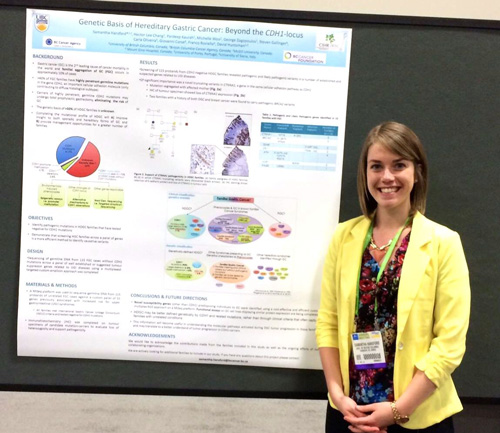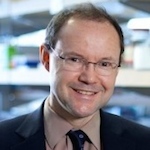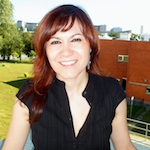
A major breakthrough in the area of familial stomach cancer research was the discovery of the gene E-cadherin (CDH1) and the direct connection between genetic mutations and hereditary diffuse gastric cancer (HDGC). Since this discovery, hundreds of families worldwide have been tested and over one hundred found to carry a genetic mutation in the CDH1 gene that dramatically increases a carrier’s susceptibility to stomach and breast cancer. With this breakthrough came risk-management opportunities to those found to carry a mutation, such as prophylactic surgery to completely eliminate the risk for this lethal disease. Despite CDH1-testing providing over 40% of HDGC families with the information necessary to significantly reduce their risk of stomach cancer, such genetic changes are not found in the remaining 60% of families and CDH1 is currently the only gene tested. Consequently, the majority of HDGC families are left with a strong burden of uncertainty as to if they are at an increased risk for stomach cancer.
Growing up on the small island of Newfoundland on the east coast of Canada, my family has been riddled with occurrences of both stomach and breast cancer. My grandmother (both a stomach and breast cancer survivor) suffered the loss of 6 siblings to cancer and in 2002, we lost my aunt at the young age of 40 after a lengthily battle with stomach cancer. It was around this time when my family met with a local genetic counselor that brought our attention to Dr. David Huntsman’s group (Vancouver, BC) and a study they were conducting on HDGC. They were offering CDH1-gene screening to families that met specific criteria for familial stomach cancer and our family was surely a candidate.

After testing positive for a CDH1-genetic mutation, my uncle and mother decided to prophylactically remove their stomachs, ultimately saving their lives as post-surgical evaluation of their stomach tissue revealed small cancerous lesions. Knowing I was at a 50% risk of inheriting the mutation, deciding to undergo testing came easily as the consequences of remaining naive were too great. After enduring the emotions of genetic counseling, my sister and I both received the incredible news that we do not carry a CDH1-mutation and are therefore at no greater risk for stomach cancer than the general population. It was after this moment that I decided to pursue the path of research and medicine. I asked myself many questions, including: how would my family have felt if no CDH1-mutation was found? To me, not knowing what gene was likely causing the cancer in our family would have set me up for a lifetime of anxiety and unrest. I began looking for opportunities to become involved in hereditary cancer research and was given the incredible opportunity to move to Vancouver, British Columbia and work in Dr. Huntsman’s lab. My goal was to provide a greater number of HDGC families with a genetic landscape to their disease in hopes that others could one day feel the same relief that I had.

Working under the guidance of Dr. Huntsman and collaborating with Dr. Carla Oliveira (Porto, Portugal) has allowed me to contribute to the cutting edge research in this field and fulfill my aunt’s legacy. I recently completed a Master’s degree with Dr. Huntsman as my supervisor, focusing my research on identifying new genes that contribute to the HDGC spectrum. I used an advanced genetic sequencing technique to focus on specific areas (genes) of interest in the human genome. Compared to costly and time-consuming full genome sequencing, this new technique can screen multiple (up to 96) individuals across a specific panel of genes selected for the disease of interest. Through this project, we screened 140 HDGC families without CDH1-mutations and successfully identified potential disease-causing mutations in several new genes that have never before been connected to this disease.
The funding from the No Stomach For Cancer organization allows us to carry these findings to new heights. We are collaborating with groups across the globe that study this syndrome and are collecting the largest cohort of HDGC families with unexplained hereditary stomach cancer in order to screen them against our new genes of interest. This will confirm the contribution these genes make to HDGC and open the door for clinicians and genetic counselors to offer a greater number of families with potentially risk-management opportunities. In addition, Dr. Oliveira’s group will conduct functional studies on regions of the CDH1 gene never before thought to increase risk for cancer. In doing so, she is hoping to prove that mutations in these regions do, in fact, increase susceptibility for stomach cancer and provide families with such mutations the same risk management opportunities as those with prominent CDH1 variants.
Combining knowledge of CDH1-mutations with our current study will significantly impact the field of familial stomach cancer. We aim to uncover new causes and work toward completing the genetic profile of HDGC. Doing so will extend the range of genetic testing offered to HDGC families and help them make informed decisions about their risk-stratification and cancer prevention.
We want to sincerely thank No Stomach For Cancer and members of the community for providing the funding necessary to carry this project forward. Their tireless efforts to expand research, educate the public and raise awareness continue to make milestones in the field of stomach cancer.
I am thrilled to be working on a project dedicated to unearthing the root-cause of stomach cancer in a greater number of families, while providing them with the same opportunity given to my family to face their risk head on.
By Samantha Hansford, MSc
On behalf of
Dr. David Huntsman (Vancouver, British Columbia)
Dr. Carla Oliveira (Porto, Portugal)